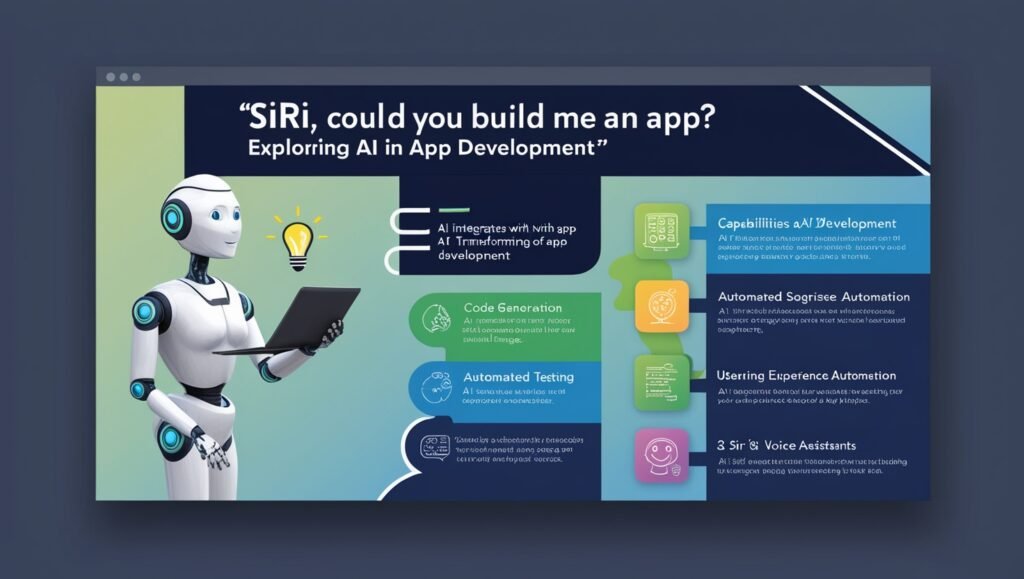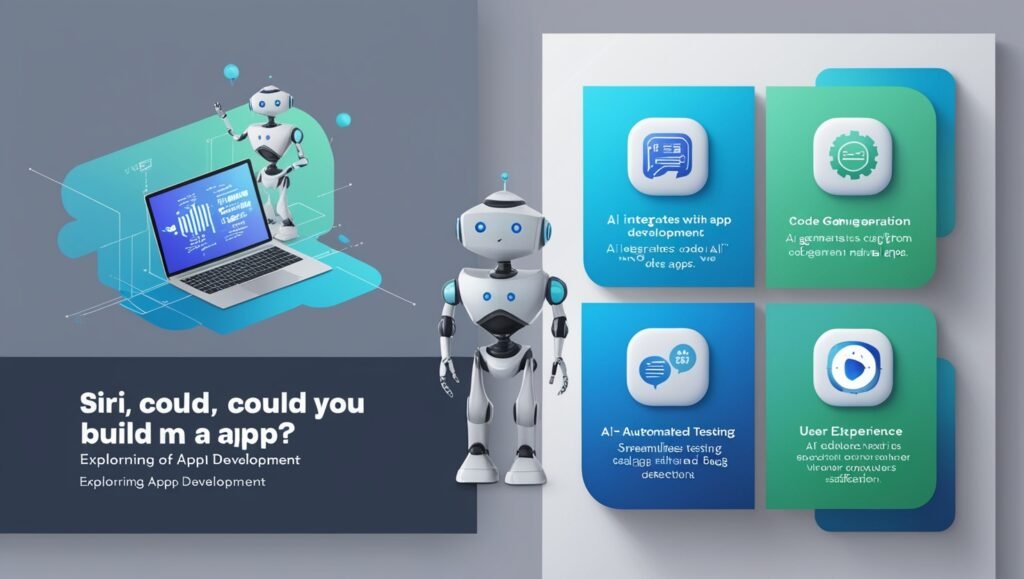In today’s tech-savvy world, personal assistant applications like Siri, Alexa, and Google Assistant have transformed the way we interact with technology. From setting reminders to controlling smart home devices, voice-activated interfaces have made life easier and more intuitive. But as artificial intelligence advances, the question arises: “Siri, could you build me an app?” While it may sound futuristic, the convergence of AI and app development is not just a dream; it’s a burgeoning reality. In this article, we’ll explore the capabilities of AI in app development, the current tools available, and how this will shape the future of the tech industry.

Understanding the Role of AI in App Development
1. The Evolution of AI Technologies
AI has come a long way since its inception. Early systems were rule-based and required extensive manual programming. Today, machine learning, natural language processing, and deep learning lay the groundwork for intelligent systems that can understand user intent and adapt to various tasks. As a result, AI is now capable of assisting developers in several aspects of app development:
- Code Generation: AI models can understand natural language and generate code based on specifications provided by developers or users.
- Testing: AI can automate the testing process, identifying bugs and suggesting fixes more efficiently than traditional methods.
- User Experience: AI technologies can analyze user behavior to adjust app features dynamically, improving engagement and satisfaction.
2. Voice Assistants: The Gateway to AI-Powered Development
Voice assistants like Siri are increasingly becoming integral to our daily lives. These applications leverage AI to understand user queries, allowing for a seamless interaction with technology. Imagine a scenario where instead of manually coding an app, you could simply articulate your requirements to your voice assistant: “Siri, could you build me an app that tracks my workout routine and suggests personalized meal plans?”
This command opens up discussions about the future of AI in development. While current voice assistants aren’t yet equipped to build complete applications on their own, they can certainly assist in various stages of the development process.
The App Development Landscape Today
1. No-Code and Low-Code Platforms
No-code and low-code platforms have democratized app development, allowing individuals with little to no programming expertise to create functional applications. These platforms, such as Adalo, Bubble, and OutSystems, enable users to build apps using visual interfaces and drag-and-drop features.
Pros of No-Code and Low-Code Platforms:
- Accessibility: Makes app development accessible to a broader audience.
- Speed: Reduces the time required to develop and deploy apps.
- Cost-Efficiency: Minimizes the need to hire extensive development teams.
Cons:
- Limited Customization: While templates are convenient, they may not meet the specific needs of every project.
- Scalability Issues: Some platforms may not handle large-scale applications efficiently.
2. The Role of AI in No-Code/Low-Code Development
AI can enhance no-code and low-code platforms by providing suggestions based on user behavior, predicting the best layouts, and even offering intelligent components that react to user interactions. Imagine logging into a no-code platform and saying, “Siri, please add a user authentication feature to my app.” This ability would significantly streamline the development process.
AI Tools for App Development
As we move further into the digital age, several AI-powered tools have emerged that can assist in app development. Here are some noteworthy examples:
1. OpenAI Codex
OpenAI Codex is an extension of GPT-3 designed for programming. It can generate code snippets in various programming languages based on natural language prompts, making it an invaluable tool for developers looking to expedite their coding process. For instance, a user could input, “Create a simple to-do list app in Python,” and Codex would produce the underlying code.
2. GitHub Copilot
GitHub Copilot, powered by OpenAI Codex, acts as a code completion tool that suggests entire lines or blocks of code as you type. It leverages context from comments and already-written code to create relevant suggestions.
3. ChatGPT
While primarily designed for conversation, ChatGPT can assist in generating ideas, solving coding issues, and even providing explanations for complex code snippets. It’s an excellent tool for developers seeking guidance or inspiration for their projects.
Practical Example of Using ChatGPT
Imagine a developer working on a new app. They might say, “ChatGPT, I’m trying to implement a feature that lets users upload images. How should I handle this in my code?” ChatGPT could provide step-by-step guidance on building that feature, along with example code.
The Future of AI in App Development
1. Enhanced Collaboration Between Users and AI
As AI capabilities expand, users will have more opportunities to collaborate with AI in development. The idea of directly conversing with an AI to outline app requirements, verify functionality, and even troubleshoot issues is becoming increasingly feasible. A future scenario might involve you saying, “Siri, I need an app for my small business that tracks inventory and generates sales reports.”
In this context, Siri could:
- Understand your needs based on previous conversations.
- Suggest relevant templates or components available in no-code/low-code platforms.
- Generate a prototype and deploy it automatically for testing.
2. Advanced Personalization
AI will also enable more personalized user experiences within apps. By harnessing data, AI can analyze user behavior, preferences, and feedback to customize features and functionalities, ensuring that every user has a tailored experience.
3. Continuous Improvement Through Learning
The integration of AI not only helps in the initial development phase but also allows apps to evolve. Machine learning algorithms can continuously analyze how users interact with an app to identify areas for improvement, automatically suggesting features that could enhance user engagement.
Considerations and Challenges
Even as AI continues to evolve and reshape the app development landscape, there are challenges that need addressing:
1. Quality Assurance
While AI can generate code, the quality and security of that code are paramount. Leveraging AI in development requires a rigorous testing framework to ensure that the generated code is efficient, secure, and bug-free.
2. Ethical Implications
AI’s role in development raises ethical considerations, particularly regarding data privacy and security. Developers must ensure that they comply with legal standards and ethical guidelines when using AI.
3. Dependence on AI
As developers become increasingly dependent on AI tools, it’s essential to maintain strong foundational programming skills. Relying solely on AI-generated code without a solid understanding of programming principles can lead to significant issues down the line.
Real-World Applications
Several companies and startups are already leveraging AI technologies in their app development processes. Here are a few notable examples:
1. Airbnb:
Uses machine learning algorithms to predict pricing based on various factors such as location, amenities, and market demand. This tailoring is pivotal for both guests looking for accommodations and hosts aiming to maximize their earnings.
2. Spotify:
Employs AI to curate personalized playlists and recommend songs. By analyzing user listening behaviors and preferences, Spotify creates an enhanced musical experience, increasing user engagement and satisfaction.
3. Trello:
Incorporates AI features to streamline project management. For example, Trello’s automation capabilities allow users to set up triggers for specific actions, making project workflows more efficient.

Conclusion
The future of app development is bright, with AI poised to play a pivotal role. While personal assistants like Siri are not yet capable of fully building apps independently, their potential to assist and enhance the development process is undeniable. As we continue to see advancements in AI technologies, the boundaries of what’s possible in the realm of app development are expanding rapidly.
As we advance, it’s crucial for developers, businesses, and users to stay informed about the latest methodologies and tools in the AI landscape. The collaboration between humans and machines can lead to innovative solutions that will change how we interact with technology.
For further insights into AI and app development, check out the OpenAI website, where you’ll find a wealth of resources about the capabilities and potential of AI in various fields, including programming and software development.
SEO Keywords:
- AI app development
- Siri app development
- No-code platforms
- AI tools for coding
- Future of app development
- OpenAI Codex
- GitHub Copilot



